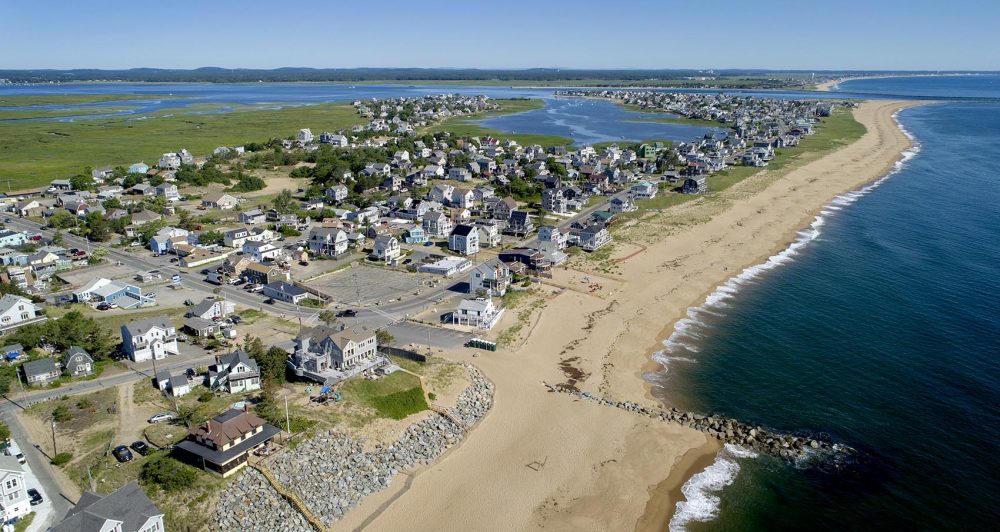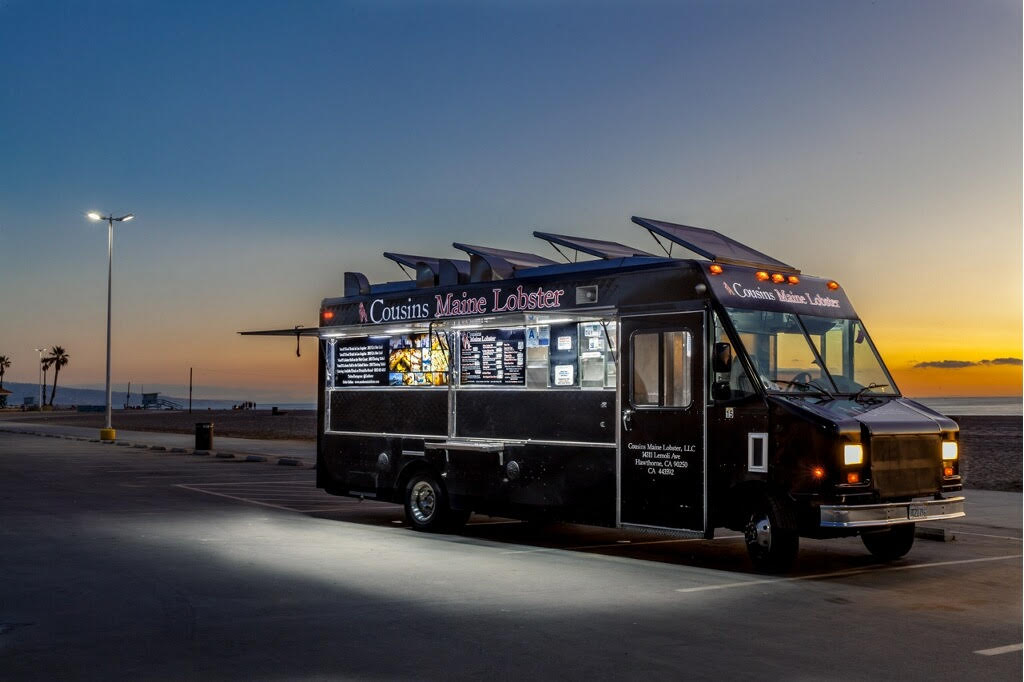Episode 103

This week on NEXT: months after Hurricane Maria hit Puerto Rico, we check-in on life on the island. Plus, we look at conservation projects around New England, including a debate between “green” and “grey” infrastructure on Plum Island, Massachusetts. We visit a forest in Vermont that is helping to meet greenhouse gas goals in California and review a debate about whether or not to turn an old stone quarry into a massive reservoir in Connecticut. We hear about a proposed development in Central Vermont and the four small towns that banded together to stop it. Finally, we discuss how the trade war between the U.S. and China is affecting Maine’s lobster industry, and speak with two cousins who are bringing the Maine lobster bake around the country.
It’s NEXT.
Puerto Rico Recovery Efforts Continue Long After Maria
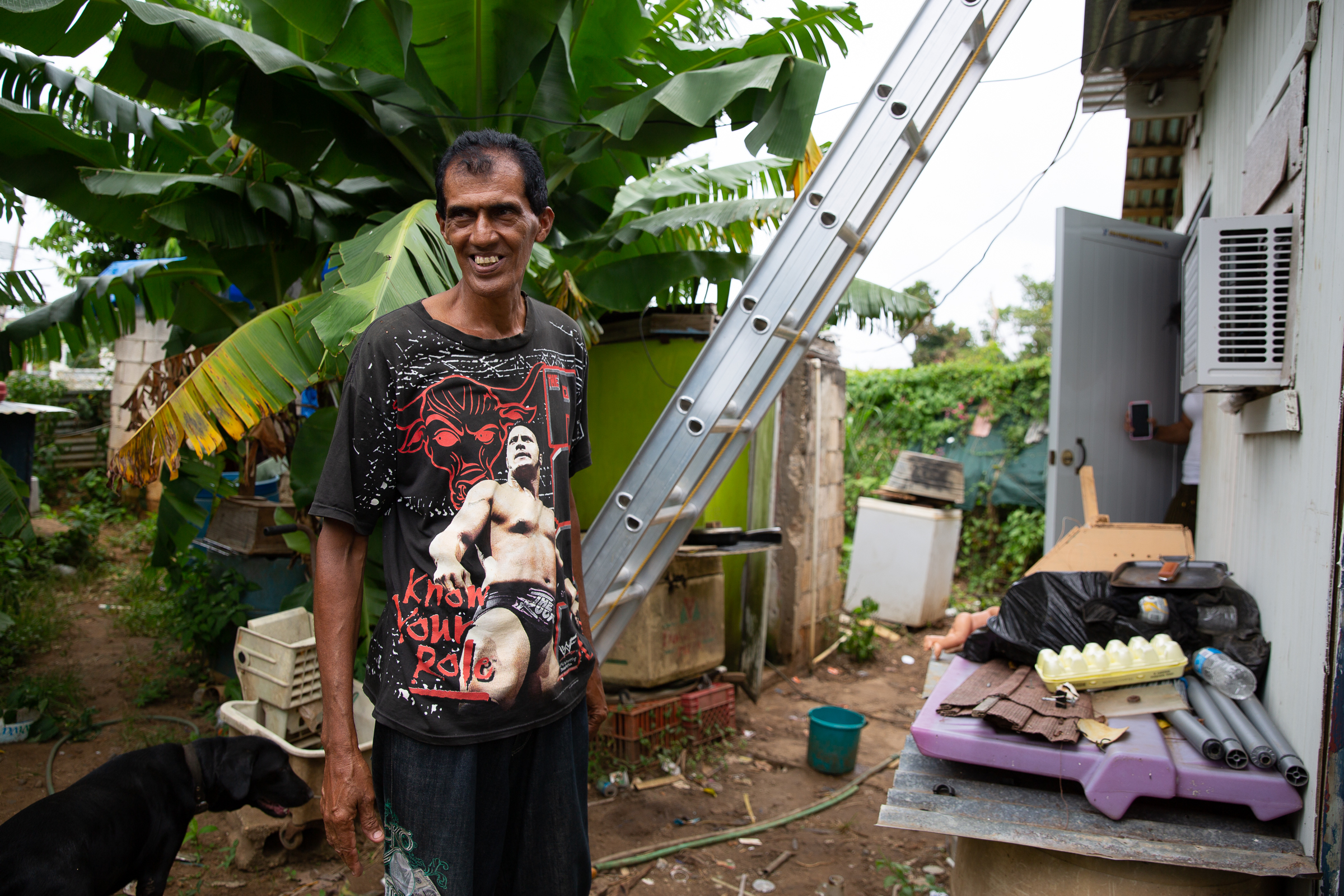
Manuel Antonio Perez Rosa lost the back half of his house during Hurricane Maria. He received federal money for building materials through a volunteer organization but didn’t have money for labor. Photo by Ryan Caron King for Connecticut Public Radio
Almost ten months after Hurricane Maria hit Puerto Rico, Connecticut Public Radio’s Jeff Cohen visited the Island to check-in on recovery efforts. He brings us a story about neighbors helping neighbors.
For more stories about Puerto Rico after Hurricane Maria, visit Connecticut Public Radio’s page, “The Island Next Door.”
“Green” Versus “Gray” Infrastructure
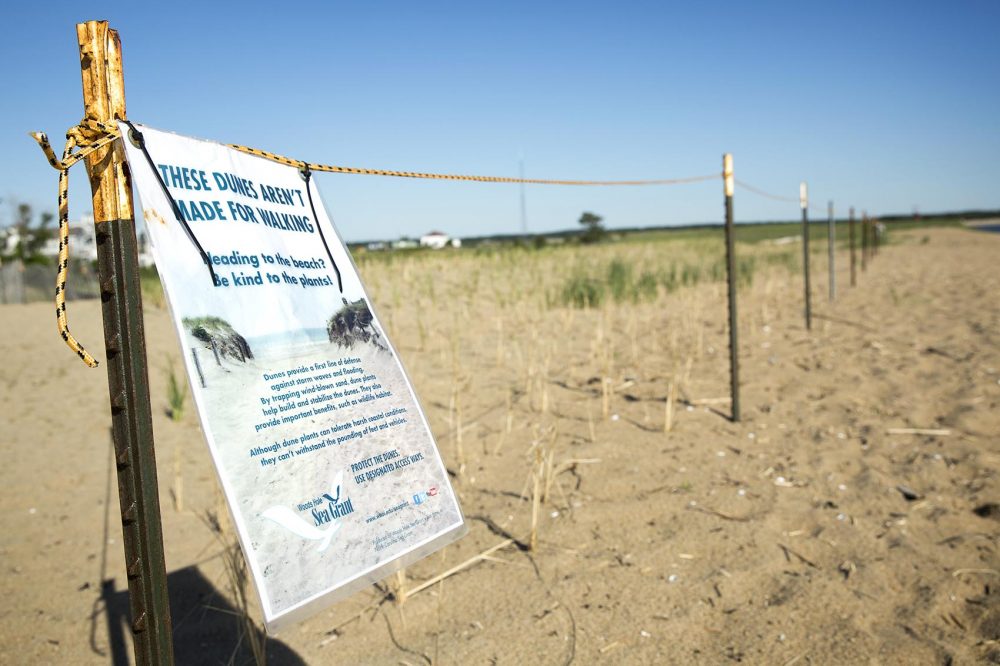
An area of recently planted beach grass on Plum Island is roped off for its protection. Photo by Robin Lubbock for WBUR
In coastal communities across the region, residents are grappling with big questions relating to sea level rise: how to protect themselves, their homes and their communities.
WBUR’s Simón Rios takes us to Plum Island off of Massachusetts, where residents are taking matters into their own hands. And they’re doing it in very different ways–a contrast in what designers are calling “green versus gray” engineering.
A New Market For Conservation Projects
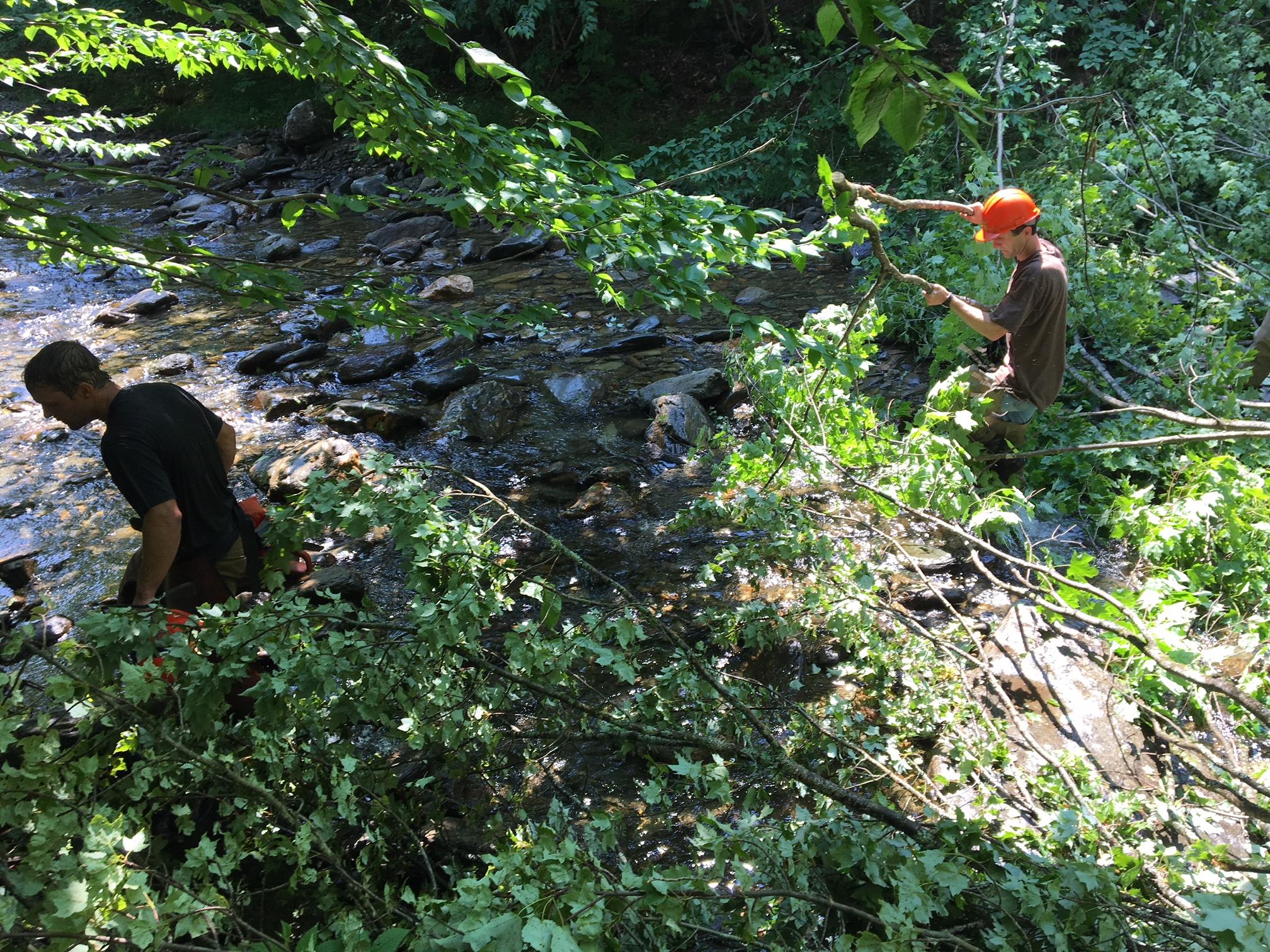
To improve habitat on Calavale Brook, first, you have to drop some trees in the stream. Photo by John Dillon for VPR
A conservation group is preserving a 5,400-acre tract of forest in Northern Vermont. And they’re creating a new model for how to fund conservation efforts in the process: in addition to being a home for wildlife, this forest will also be used to store carbon to meet greenhouse gas goals set 3,000 miles away in California.
As VPR’s John Dillon reports, the money from that deal with help the group pay for future restoration projects.
Rock Quarry or Reservoir?

Activists from the group Protect Our Watersheds CT hike through part of the area where Tilcon is proposing to expand its nearby trap rock quarry. Photo by Patrick Skahill for Connecticut Public Radio
In Connecticut, a debate is underway about what to do with a protected stretch of watershed land between a public drinking water supply and an old stone quarry. Tilcon, the quarry’s owner, says its mine is running out of rock. So it’s petitioning to change state law, in the hopes of expanding operations into that protected land. In exchange, when the mining’s done, the company says it will convert the site into a massive reservoir. One that could nearly double local water storage capacity.
As Connecticut Public Radio’s Patrick Skahill found out, the politics of selling that idea could be tougher than squeezing water from a stone.
Four Communities in Vermont Team Up to Fight Developer
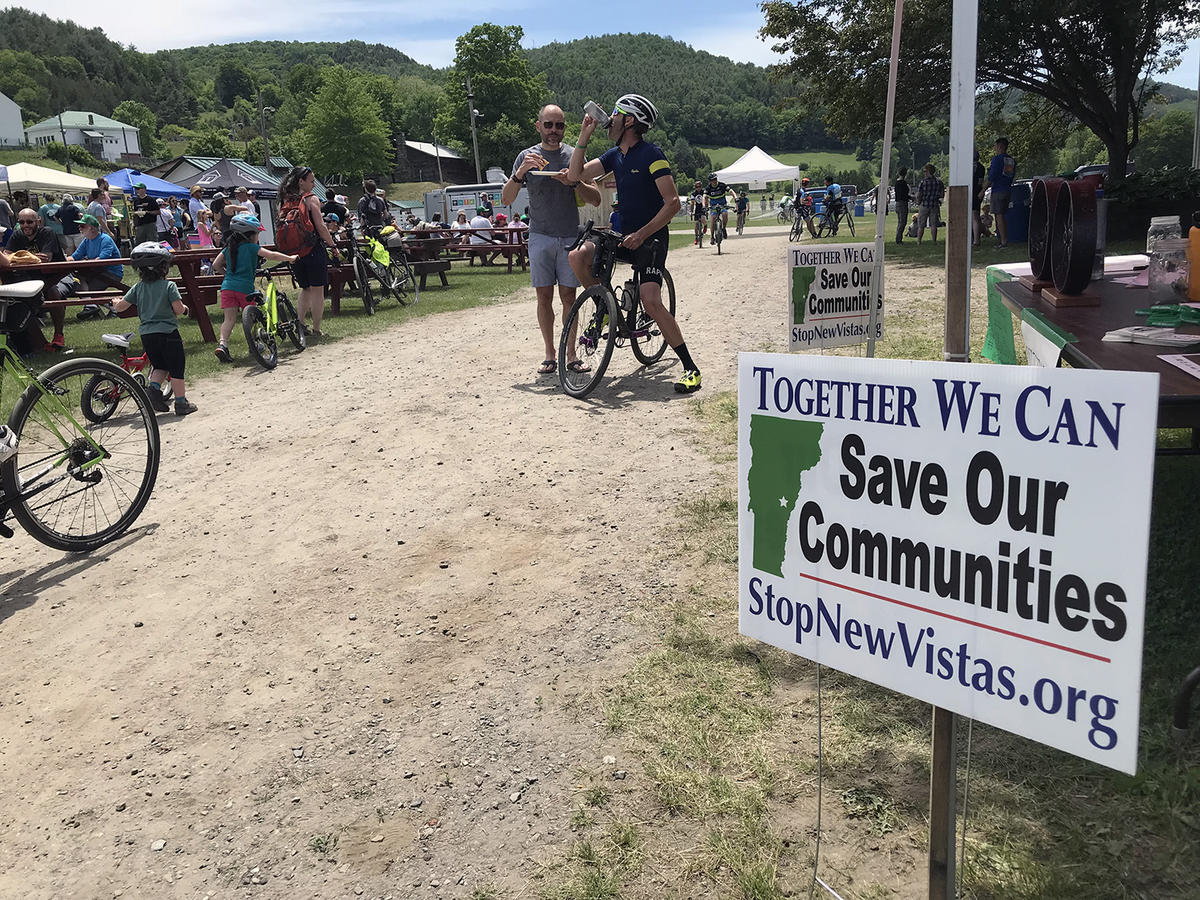
More than 200 riders turned out in early June for a fundraiser bike ride through Tunbridge and Strafford put on by the Alliance for Vermont Communities to stop NewVistas. Photo by Angela Evancie for VPR
This month, Vermont Public Radio’s people-powered podcast, Brave Little State, answered the question: “What is the deal with the NewVistas Foundation and its plan for Central Vermont?” If you live in Vermont, you’ve probably heard about NewVistas. A wealthy businessman began buying land in Vermont, which he planned to convert into a kind of energy efficient community that would house 20,000 people on just 5,000 acres. But the local towns were very opposed to the idea. And at the end of June, the plan was abandoned.
Brave Little State tells the story of NewVistas and the effort against it in their most recent episode: “4 Vermont Towns v. 1 Utah Developer: What Happened with NewVistas.” Angela Evancie, the host, and creator of Brave Little State, joined us to tell us more about what happened.
Chinese Tariffs Threaten Maine’s Lobster Industry
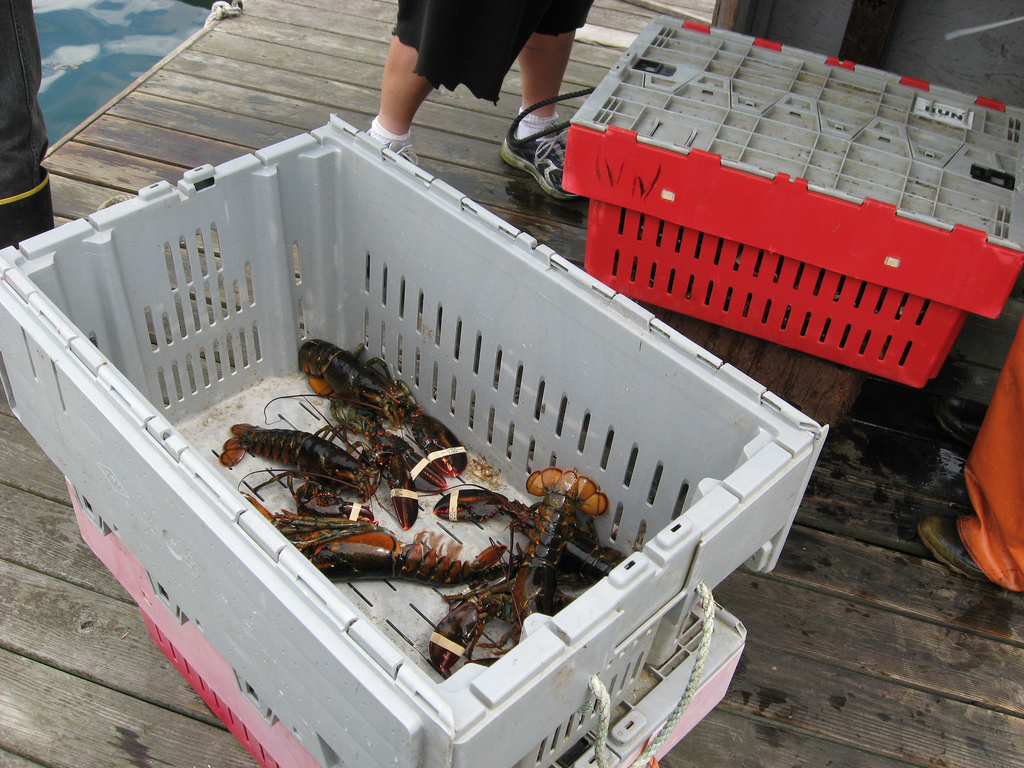
Lobsters caught by Spruce Head Fisherman’s Coop in South Thomaston, Maine. Photo by Maine Public Radio
Maine lobsters are in the crossfire of the trade war between the U.S. and China. Earlier this month, China more than doubled tariffs on lobster from U.S. sources, leaving the lobster industry in Maine uncertain about their future in the Chinese market.
As Maine Public Radio’s Fred Bever reports, lobster dealers who’ve seen sales to China shoot up over the last decade are now suddenly shut out.
Cousins Maine Lobster
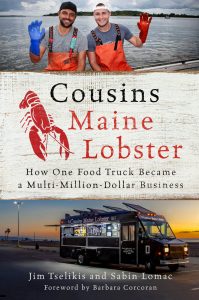
“Cousins Maine Lobster: How One Food Truck Became a Multi-Million-Dollar Business.” Courtesy of Cousins Maine Lobster
As Maine’s lobster industry is facing challenges, there’s still something idyllic about the product: Maine lobster and, of course, the Maine lobster bake.
Sabin Lomac is no stranger to the Maine lobster bake. He grew up in Maine, and, although he has since moved away, his childhood memories of simple, homemade lobster rolls inspired he and his cousin, Jim Tselikis, to start a business: “Cousins Maine Lobster.”
It all started as a food truck, that served, you guessed it, Maine lobster. Since they opened their first truck out in L.A., they have expanded to over a dozen cities, including Portland, Maine, and a truck that is coming soon to Southern Connecticut, as well as opening restaurants around the world, and writing a new book, Cousins Maine Lobster: How One Food Truck Became a Multi-Million-Dollar Business. Sabin Lomac joins us to discuss his love of Maine lobster.
Read an excerpt of the book here.
Photo at top of page: Plum Island. Photo by Robin Lubbock for WBUR
About NEXT
NEXT is produced at Connecticut Public Radio
Host: John Dankosky
Produced with help this week from Lily Tyson and Ali Oshinskie
Digital Producer: Carlos Mejia
Executive Producer: Catie Talarski
Contributors to this episode: Jeff Cohen, Simón Rios, John Dillon, Patrick Skahill, Angela Evancie, Peter Hirschfeld, Fred Bever
Music: Todd Merrell, “New England” by Goodnight Blue Moon, “Tristane” by Oskar Schuseter, “Jigsaw Puzzle Blues” by Fleetwood Mac
Stream every episode of NEXT.
We appreciate your feedback! Send critiques, suggestions, questions, and ideas to next@wnpr.org. Follow us on Facebook and Twitter.
If you like what you hear, make sure to rate and review us on iTunes so other listeners can hear conversations from around New England.

